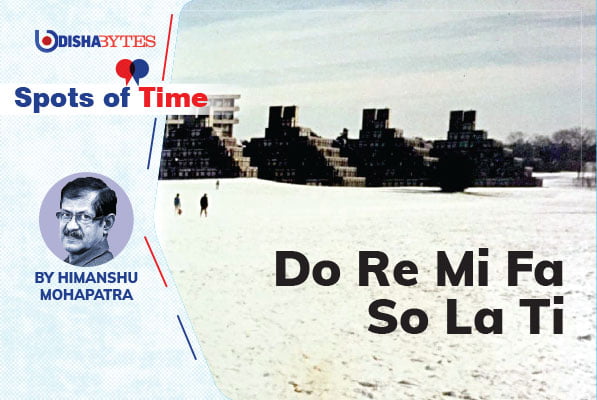Do Re Mi Fa So La Ti
Episode 2 of Flash Fiction Series 'Spots of Time'

Do(e) Re Me Fa(r) So La Ti….
Every time Subrat thought about the cult song from The Sound of Music, he stopped short at ‘So’.
“How does ‘a needle pulling thread’ explain the musical note ‘So’? It was certainly not clear like ‘Do(e) a deer, a female deer’ or ‘Re (Ray), a drop of golden sun’.”
Decades would pass before he was able to crack the code. But it didn’t happen where it should have, in England.
A cutback to one of those days in the late 1980s ….
Subrat stood in the common kitchen of Norfolk Terrace on the UEA campus as the afternoon sun was waning. The kitchen was the nodal point of each residential floor of the terrace. The floors were stacked up like the pyramid, the nodes in the centre jutting out prominently to give a panoramic view of the lush environs.
The novelty of the view had worn off after two and a half years in Norwich, a south eastern city in England.
The quiet of the moment was suddenly disrupted by the onrush of shuffling feet, loud voices and raucous laughter. Unmistakeable signs of the new wave of seasonal migration from India that had found lodgement in Norfolk Terrace a week or so ago. The Indian contingent, most of them from the elite administrative services, had arrived in UEA for their Masters in Development Economics. A purely decorative degree for them. They were a disgruntled lot. The kitchen was where they let off steam.
“Well, there’s nothing that these professors here can teach us,” Shastri said.
“They are just academics, condemned to writing prose all their life,” supplemented Rajan, the most vocal in the group.
“Well, one wishes one acquired a lovely English style and accent during one’s stay here,” another person hoped.
“I very much doubt that. Look at Subrat. More than two years in England, but with no visible effect on his English.”
Rajan surely put his finger on something. He didn’t of course pause to consider that it was the same boat situation for all of them…
Subrat often thought back to that first day when his English dream both kick-started and crashed at the same time.
He boarded the British Airways flight 142 at Calcutta Airport on 2 October 1985. He who had not been on a domestic flight until then was making his flying debut on an international flight. The plane landed at terminal 4 of Heathrow Airport at 6.00 the next morning.
He expected hell when he emerged into the rush and hubbub of London. Adding to his consternation, his compatriot from Cambridge was nowhere to be seen. But signs led him to the bus stand outside easily enough. As instructed, he got off at Victoria Station and went to Platform 14. The courier from the British Council ushered him and half a dozen others into the British Council building at 10 Spring Gardens.
The same day he also reached Norwich, taking the tube to Liverpool Street Station and then the train for the rest of the two-hour journey. Everything had gone like clockwork. Yes, there was a bit of a delay due to his slow and cautious approach, but nothing to upset his applecart.
A downside to this well-ordered universe soon manifested itself. London was so well organised and sign posted that here seeing was at a premium, not speaking. And precisely because of that the newcomer found himself thrust into the glorious speechlessness of a Buddha. Subrat had uttered scarcely two or three sentences during the course of the day.
The only full sentence he had spoken was to the British Council officer:
“How would I proceed from this building to Liverpool Street Station?”
She had pointed out the station on a map and traced an indistinct route with her pencil. “This here is Charing Cross. You get from there to Liverpool Street,” she had said. It had not helped, but he didn’t miss the officer’s quiet underlining of ‘get’ as the word preferred over ‘proceed’. He had located Charing Cross station simply by looking for the underground sign.
…..
In Norwich things improved somewhat, but not dramatically. Even here occasions to engage with the native speakers for one’s bare needs were minimal. If one could point for food on display at the counter and self-serve, where was the need to speak?
Why take a chance at the refectory and ask for ‘peas’ if you’d be served ‘beans’ instead? That had happened to him on the very first day of his eating out, as he said his ‘p’ in Indian style, without aspirating it. He would be careful next time, but would likely trip on some other ‘p’ word.
So Subrat took refuge in the library. In his ziggurat – name of a Norfolk Terrace room – he retreated to his books.
He could as well have been in India. His compatriots on the floor helped to complete the insulation. They remained blissfully unaware that ‘So’ was for ‘Sew’, a needle pulling thread.
In the heart of England his English dream had significantly collapsed.
Also Read: A Capital Betrayal: When A Good Luck Story Took A Bad Turn

Comments are closed.